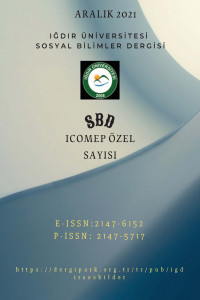Abstract
Bu çalışmada 27 Mayıs 1960 askerî müdahalesi sonrasında Orgeneral Cemal Gürsel başkanlığında yönetimi devralan Millî Birlik Komitesi’nin (MBK) üyesi olarak darbeden sonra fiilî anlamda başbakanlık görevini üstlenen ancak 13 Kasım 1960’ta tasfiye edilerek kendisine askerî vesayet yönetimince Hindistan’da müşavirlik görevi ihdas edilen Alparslan Türkeş’in Yeni Delhi’deki siyasi faaliyetleri incelenmektedir. Bu araştırmada 13 Kasım 1960 tasfiyesi ve Türkeş’in sürgüne gönderilişine, sürgündeki faaliyetlerine, yurda dönüşüne ayrıca onun siyasete giriş sürecine kısaca değinilmektedir. Türkeş yurt dışı görevini ifa ederken bir taraftan da önemli siyasi faaliyetlerde bulunmuştur. Onun sürgündeki siyasi faaliyetlerden ilki kendisiyle birlikte tasfiye edilen 14’lerin diğer mensuplarına ulaşması ve yazdığı mektuplar vasıtasıyla son ana kadar grubun motivasyonunu yüksek tutmasıdır. İkinci olarak Türkeş, ülke açısından hayati öneme sahip meselelerde yurt dışında bulunmasına rağmen dönemin idarecilerine ikazda bulunmayı kendisine bir görev addetmiştir. Türkeş, kendisi zor şartlar altında iken Adnan Menderes ve arkadaşlarının idam edilmemesi için büyük çaba sarf etmiştir. Türkeş’in ana faaliyetlerinden üçüncüsü ise sürgündeyken aktif siyasete katılmak niyetinde olmadığını beyan etmiş olmasına rağmen karizmatik bir lider adayı olarak kamuoyu oluşturabilmesidir. Ana gayesini özetlediğimiz bu çalışmada kitaplar yanında süreli yayınlar ve Türkeş’in bizzat kaleme aldığı mektupları kapsamlı olarak incelenmiştir.
References
- Ahmad, Feroz. Bir Kimlik Peşinde Türkiye, İstanbul: İstanbul Bilgi Üniversitesi Yayınları, 2007.
- Ahmad, Feroz. Modern Türkiye’nin Oluşumu, İstanbul: Doruk Yayınevi, 2002.
- Alsaç, Neşe Tarhan. Türkiye’de Milliyetçilik ve Kalkınma: Alparslan Türkeş’in Çalışmaları ve Günümüze Etkileri, 2009.
- Anadol, Cemal. Alparslan Türkeş: Olaylar Belgeler Hatıralar ve MHP, Burak Yayınevi, 1995.
- Bahar, İlhan. Başbuğ Türkeş ve Dokuz Işık, İstanbul: Kamer Yayınları, 2015.
- Cengiz, Oğuzhan. Alparslan Türkeş: Başbuğ, İstanbul: Bilgeoğuz Yayınları, 2020.
- Çalık, Mustafa. MHP Hareketi (1965-1980), Ankara: Cedit Neşriyat, 2. baskı, 1995.
- Çatak, Muzaffer. Dündar Taşer’in Fikir Hayatı, 2009.
- Demir, Ali Faik. (ed.), Türk Dış Politikasında Liderler, Gül Arıkan Akdağ. Türkeş’in Liderliği ve Siyasi Görüşü, İstanbul: Bağlam Yayınları, 2007, s. 441-442.
Abstract
The political activities undertaken in New Delhi by Alparslan Türkeş, who assumed the position of de facto prime minister after the coup as a member of the National Unity Committee (MBK), which took over the administration under the leadership of General Cemal Gürsel following the military intervention on May 27, 1960, but was discharged on November 13, 1960 and was assigned the duty of adviser in India by the military tutelage administration, are examined in this study. This study briefly addresses the discharge dated November 13, 1960 and the exile of Türkeş, his activities in exile, his return to the country and process of going into politics. Türkeş also engaged in important political activities, while performing his duty abroad. The first of his political activities in exile was reaching out the other members of the 14's who were eliminated with him and keeping the motivation of the group high until the last moment by virtue of the letters he wrote. Secondly, despite being abroad, Türkeş deemed it as a necessary duty to warn the rulers of that time on issues of vital importance for the country. Türkeş strived to prevent the execution of Adnan Menderes and his friends while he was living under difficult conditions. The third of Türkeş's main activities was to form the public opinion as a charismatic leader candidate, although he had declared that he did not intend to participate in active politics while in exile. In addition to the books on the topic, periodicals and also the letters written by Türkeş himself were examined in detail within the scope of this study, whose main objective is summarized.
References
- Ahmad, Feroz. Bir Kimlik Peşinde Türkiye, İstanbul: İstanbul Bilgi Üniversitesi Yayınları, 2007.
- Ahmad, Feroz. Modern Türkiye’nin Oluşumu, İstanbul: Doruk Yayınevi, 2002.
- Alsaç, Neşe Tarhan. Türkiye’de Milliyetçilik ve Kalkınma: Alparslan Türkeş’in Çalışmaları ve Günümüze Etkileri, 2009.
- Anadol, Cemal. Alparslan Türkeş: Olaylar Belgeler Hatıralar ve MHP, Burak Yayınevi, 1995.
- Bahar, İlhan. Başbuğ Türkeş ve Dokuz Işık, İstanbul: Kamer Yayınları, 2015.
- Cengiz, Oğuzhan. Alparslan Türkeş: Başbuğ, İstanbul: Bilgeoğuz Yayınları, 2020.
- Çalık, Mustafa. MHP Hareketi (1965-1980), Ankara: Cedit Neşriyat, 2. baskı, 1995.
- Çatak, Muzaffer. Dündar Taşer’in Fikir Hayatı, 2009.
- Demir, Ali Faik. (ed.), Türk Dış Politikasında Liderler, Gül Arıkan Akdağ. Türkeş’in Liderliği ve Siyasi Görüşü, İstanbul: Bağlam Yayınları, 2007, s. 441-442.
Details
| Primary Language | Turkish |
|---|---|
| Journal Section | Research Articles |
| Authors | |
| Publication Date | December 20, 2021 |
| Published in Issue | Year 2021 ICOMEP ÖZEL SAYISI |


